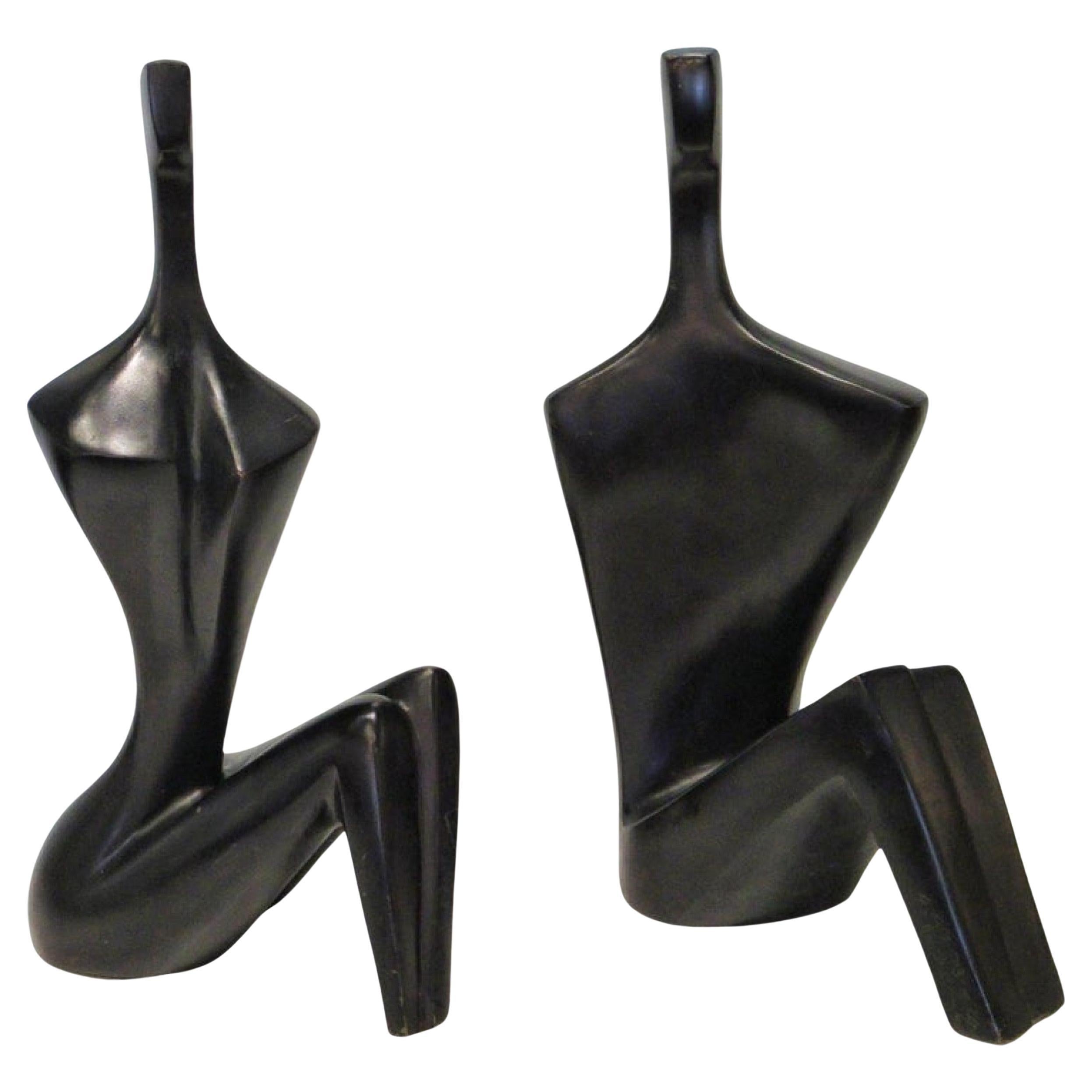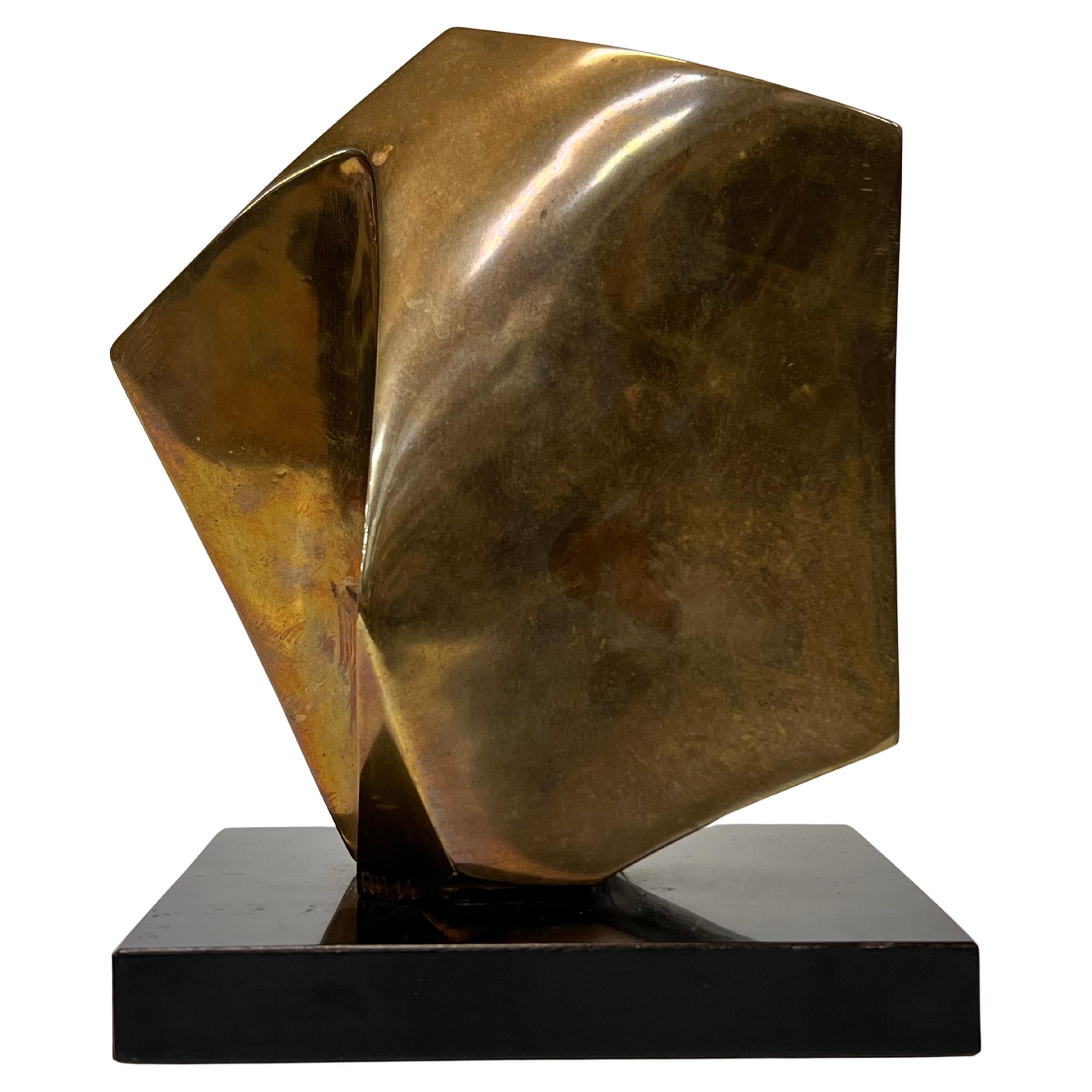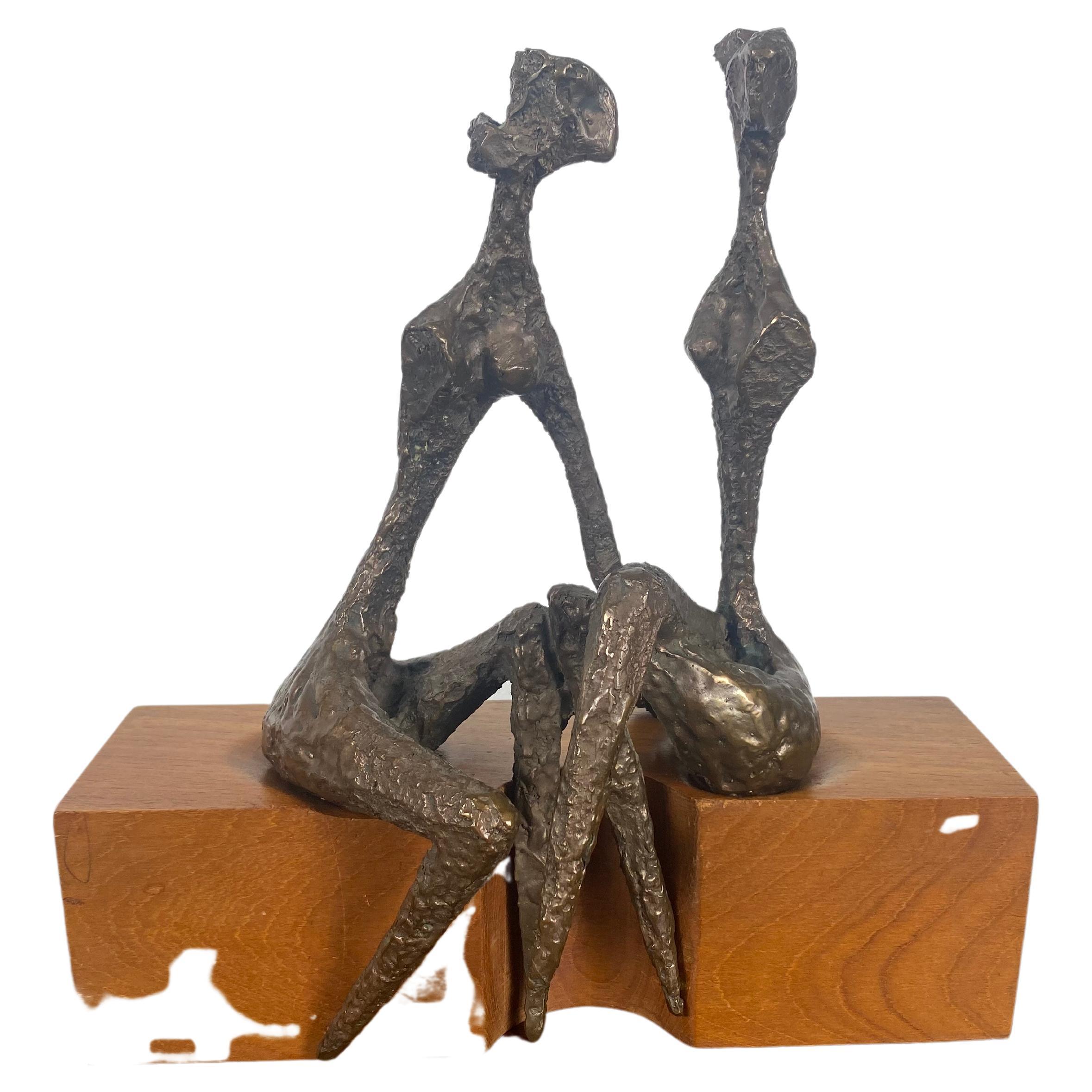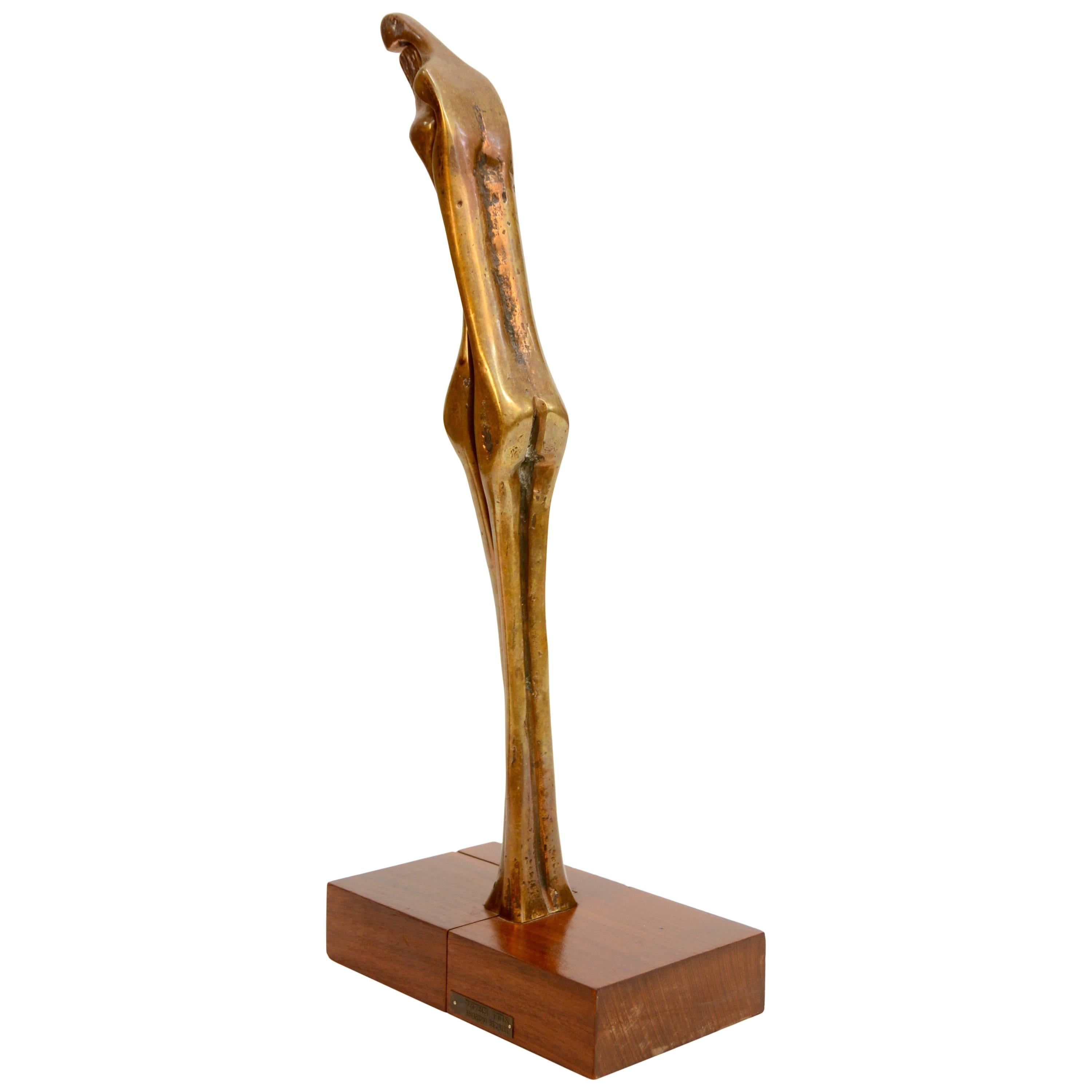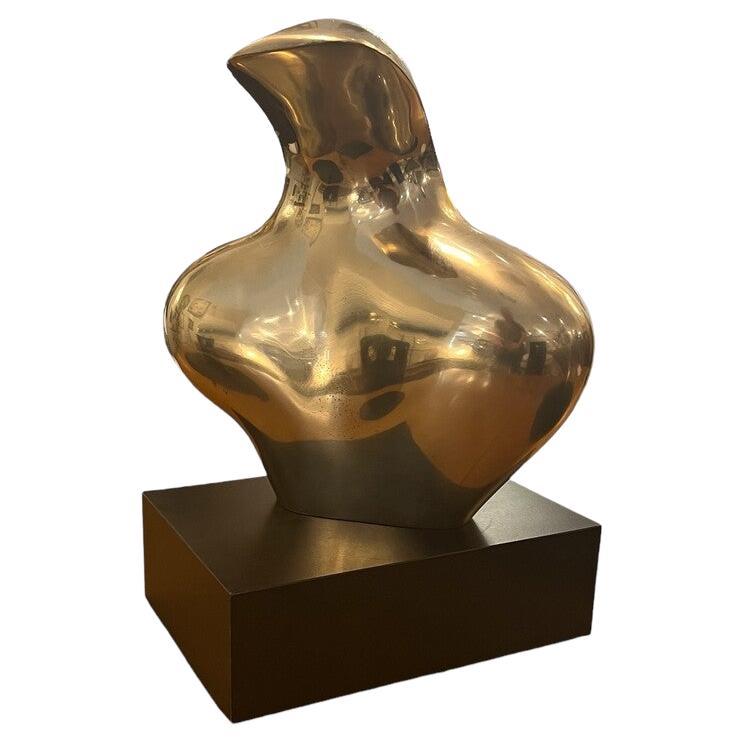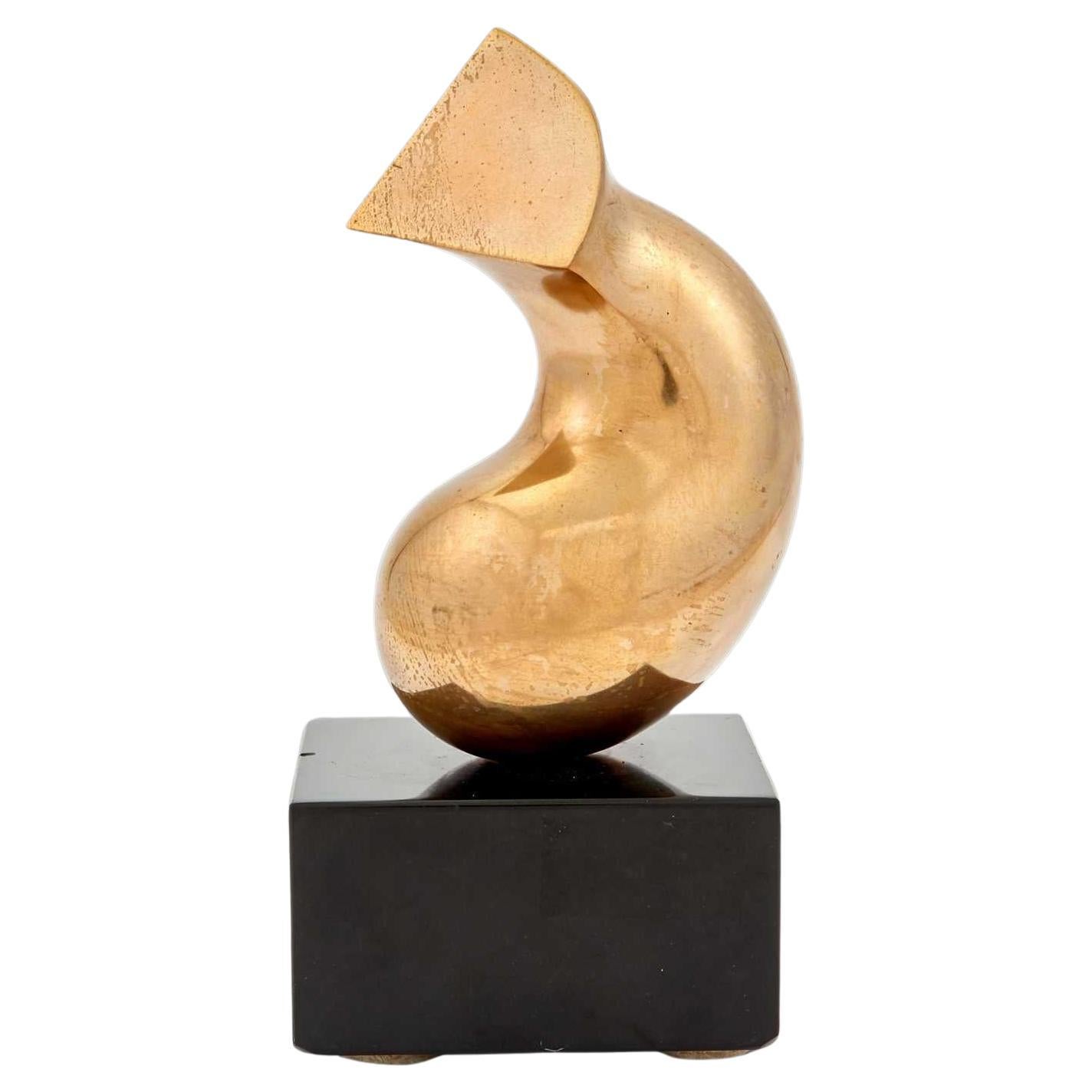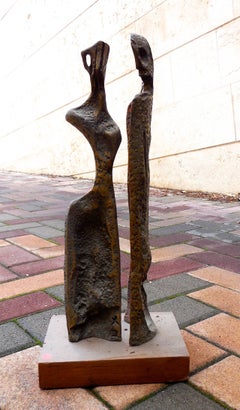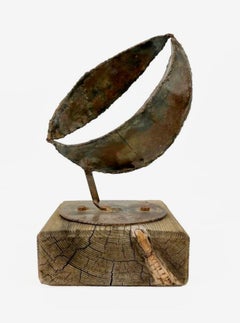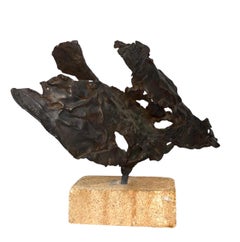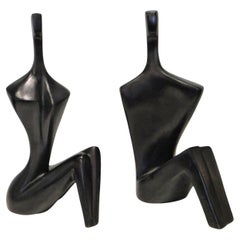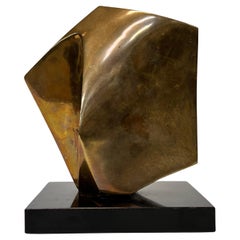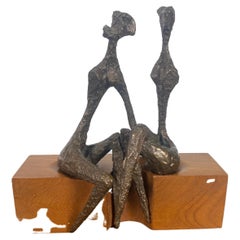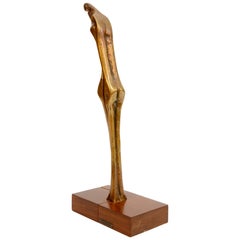Items Similar to Rare Aharon Bezalel Israeli Gilt Modernist Bronze Sculpture Suite
Want more images or videos?
Request additional images or videos from the seller
1 of 11
Aharon BezalelRare Aharon Bezalel Israeli Gilt Modernist Bronze Sculpture Suite1979
1979
$3,600
£2,729.29
€3,146.15
CA$5,070.02
A$5,622.28
CHF 2,954.09
MX$68,694.70
NOK 36,959.71
SEK 34,693
DKK 23,486.66
About the Item
The width dimensions are variable. the tallest height is 11.5 inches. Family group. A suite of three bronze sculptures.
Aharon Bezalel (born Afghanistan 1926) Born in Afghanistan in 1926 and immigrated to Israel at an early age. As a youth was engaged as a silversmith and craftsman, and was a student of the sculptor Zev Ben-Zvi from whom he absorbed the basic concepts of classic and modernist art and interpreted, according to them, ideas based on ancient Hebrew sources.
Aharon Bezalel works and resides in Jerusalem, he taught art for many years.
“I saw myself as part of this region. I wanted to find the contact between my art and my surroundings. Those were the first years of Jean Piro’s excavations at the Beer-Sheba mound. They found there, for example, the Canaanite figurines that I especially liked and that were an element that connected me with the past and with this place.” “…a seed and sperm or male and female. These continue life. The singular, the individual alone, cannot exist; I learned this from my father who dabbled with the Kabbalah.”
(Aharon Bezalel, excerpt from an interview with David Gerstein)
“The singular in Aharon Bezalel’s work is always potentially a couple if not a threesome[…] the one is also the many: when the individual is revealed within the group he will always seek a huddling, a clinging together.
The principle of modular construction is required by this perception of unity and multiplicity, as modular construction in his work is an act of conception or defense.
Two poles of unity, potentially alone, exist in A. Bezalel’s world: From a formal, sculptural sense these are the sphere and pillar, metaphorically these are the female in the final stages of pregnancy and the solitary male individual. Sphere-seed-woman; Pillar-strand-man. The disproportional, small heads in A. Bezalel’s figures leave humankind in it’s primal physical capacity. The woman as a pregnancy or hips, the man as an aggressive or defensive force, the elongated chest serves as a phallus and weapon simultaneously.
(Gideon Ofrat)
EIN HAROD About the Museum's Holdings: Israeli art is represented by the works of Reuven Rubin, Zaritzky, Nahum Gutman, Mordechai Ardon, Aharon Kahana, Arie Lubin, Yehiel Shemi, Yosl Bergner and others.
The graphic arts collection contains drawings and graphic works by Pissaro, Modigliani, Pascin, Chagall (almost all of his graphic work), and numerous other artists. The sculpture collection includes works by Jewish sculptors from all over the world including leading Israeli sculptors; Ben Zvi, Lishansky, David Palombo, Yehiel Shemi, Aharon Bezalel and Igael Tumarkin.
Many Jewish sculptors from all parts of the world, beginning with Antokolski, are represented in the collection. In the sculpture courtyard there are works by Chana Orloff, Jacob Epstein (the works he bequeathed to the Museum), Glicenstein, Loutchansky, Constant and Indenbaum from Western Europe; Glid from Yugoslavia; Zorach, Gross and Harkavy from the United States; and most of the outstanding sculptors of Israel : Ben-Zvi, Lishansky, Ziffer, Lehmann, Feigin, Sternschuss, Palombo ( who executed the iron gate of the Museum), Aldouby, Yehiel Shemi, Aharon Bezalel, Hava Mehutan, Tumarkin.
- Creator:Aharon Bezalel (1925-2012, Afghan)
- Creation Year:1979
- Dimensions:Height: 11.5 in (29.21 cm)Width: 18 in (45.72 cm)
- Medium:
- Movement & Style:
- Period:
- Condition:
- Gallery Location:Surfside, FL
- Reference Number:Seller: 13991stDibs: LU38212344412
About the Seller
4.9
Platinum Seller
Premium sellers with a 4.7+ rating and 24-hour response times
Established in 1995
1stDibs seller since 2014
1,801 sales on 1stDibs
Typical response time: <1 hour
- ShippingRetrieving quote...Shipping from: Surfside, FL
- Return Policy
Authenticity Guarantee
In the unlikely event there’s an issue with an item’s authenticity, contact us within 1 year for a full refund. DetailsMoney-Back Guarantee
If your item is not as described, is damaged in transit, or does not arrive, contact us within 7 days for a full refund. Details24-Hour Cancellation
You have a 24-hour grace period in which to reconsider your purchase, with no questions asked.Vetted Professional Sellers
Our world-class sellers must adhere to strict standards for service and quality, maintaining the integrity of our listings.Price-Match Guarantee
If you find that a seller listed the same item for a lower price elsewhere, we’ll match it.Trusted Global Delivery
Our best-in-class carrier network provides specialized shipping options worldwide, including custom delivery.More From This Seller
View AllIsraeli Abstract Figures Art Brut Polychromed Bronze Sculpture Aharon Bezalel
By Aharon Bezalel
Located in Surfside, FL
Aharon Bezalel (born Afghanistan 1926) Born in Afghanistan in 1926 and immigrated to Israel at an early age. As a youth was engaged as a silversmith and craftsman, and was a student of the sculptor Zev Ben-Zvi from whom he absorbed the basic concepts of classic and modernist art and interpreted, according to them, ideas based on ancient Hebrew sources.
Aharon Bezalel works and resides in Jerusalem, he taught art for many years.
“I saw myself as part of this region. I wanted to find the contact between my art and my surroundings. Those were the first years of Jean Piro’s excavations at the Beer-Sheba mound. They found there, for example, the Canaanite figurines that I especially liked and that were an element that connected me with the past and with this place.” “…a seed and sperm or male and female. These continue life. The singular, the individual alone, cannot exist; I learned this from my father who dabbled with the Kabbalah.”
(Aharon Bezalel, excerpt from an interview with David Gerstein)
“The singular in Aharon Bezalel’s work is always potentially a couple if not a threesome[…] the one is also the many: when the individual is revealed within the group he will always seek a huddling, a clinging together.
The principle of modular construction is required by this perception of unity and multiplicity, as modular construction in his work is an act of conception or defense.
Two poles of unity, potentially alone, exist in A. Bezalel’s world: From a formal, sculptural sense these are the sphere and pillar, metaphorically these are the female in the final stages of pregnancy and the solitary male individual. Sphere-seed-woman; Pillar-strand-man. The disproportional, small heads in A. Bezalel’s figures leave humankind in it’s primal physical capacity. The woman as a pregnancy or hips, the man as an aggressive or defensive force, the elongated chest serves as a phallus and weapon simultaneously.
(Gideon Ofrat)
EIN HAROD About the Museum's Holdings: Israeli art is represented by the works of Reuven Rubin, Zaritzky, Nahum Gutman...
Category
1960s Expressionist Abstract Sculptures
Materials
Bronze
Argentine Modernist Brutalist Abstract Bronze Sculpture Jewish Latin American
By Naum Knop
Located in Surfside, FL
Naum Knop (Ukrainian-Argentinean, 1917-1993) Modernist Brutalist bronze figural sculpture with heavy verdigris green finish. Melted forms in the shape of an abstract pretzel like twist. Affixed to white stone plinth. Artist signature, "NK" side of base. Good condition, shows rich green patina and aged oxidation. Measures approximately 17.5 in. x 19.5 in. x 6.5 in.
Naum Knop, Argentine sculptor, was born in 1917 in Buenos Aires, into a Jewish family of Russian origin from Ukraine. His childhood was spent in the neighborhood of La Paternal where his father had a carpentry workshop, a space in which he made contact for the first time with the technique of wood carving. After finishing elementary school, he worked with the teacher Luis Fernández and soon after he dedicated himself to furniture design. Around 1935, he entered the Manuel Belgrano School of Fine Arts . Between 1941 and 1942 he attended the course for graduates taught by Alberto Lagos and Alfredo Bigatti at the National School of Fine Arts and continued his training between 1942-1945 at the Ernesto de la Cárcova High School with Soto Avedaño, Carlos de la Cárcova and José Fioravanti. At this time he put his works in dialogue with other young artists such as Libero Badii and Aurelio Macchi .
Around 1947 he made his study trip abroad. He goes to California, United States, where he enters the Art Institute of Los Angeles. At the same time visit museums and galleries. In January 1948 he organized his first exhibition abroad, held at the Hall of Arts in Beverly Hills in Los Angeles. During this period he toured Chicago and then New York. That year he traveled to Europe; his itinerary includes France, Italy, Switzerland and England. As a result, he came into contact with the work of Henry Moore, Hans Jean Arp, Jacques Lipchitz, Constantin Brancusi, Umberto Boccioni, Henry Laurens, Ossip Zadkine. Artists who have an impact on the young Knop and whom he honors in his subsequent production. He returned to Argentina in 1949 and installed his workshop where he worked on ornamental carving and on pieces in which he oscillated between a synthetic figuration and abstraction.
In 1956 he began his successful participation in salons , obtaining numerous awards at the national and municipal level. In 1959 he participated in the shipment to the 5th São Paulo Biennial and since then, to the success achieved at the local level, the multiple exhibitions carried out in the international field have been added. The exhibitions in Tel Aviv , Jerusalem and Rome (1966) stand out; Dusseldorf (1977); Los Angeles and Palm Spring (1981); New York (1986), San Pablo and Los Angeles(1989). During this period, his work matured, while he began to experiment with the direct wax technique, obtaining textured surfaces similar to welds that gave it a strong abstract expressionist feature. In parallel to his personal production and to the small models, the artist receives private and public commissions for which he works on large-scale sculptures and murals. Around 1967, the architect Mario R. Álvarez summons him to participate in a closed competition for the creation of a work to be located in the General San Martín Cultural Center . Libero Badii and Enio Iommi participate with the artist ; the bronze Reclining Figure Knop is chosen. Among the large-scale monuments it is worth remembering the piece Los tres soles temporarily located in Recoleta in 1984 and later installed in Maryland, United States; as well as Seated Figure (Reminiscence of Michelangelo) located in the shield of a private building in 1970. To these are added the numerous murals in which he experiments with various materials and techniques such as casting in bronze, openwork and reliefs in wood and work in cement.
He was included in the The 1962 International Prize for Sculpture the jury included Argan, Romero Brest and James Johnson Sweeney the former director of the Solomon R. Guggenheim Museum in New York. The participants included Louise Nevelson and John Chamberlain for the United States; Lygia Clark for Brazil; Pietro Consagra, Lucio Fontana, Nino Franchina, and Gió Pomodoro for Italy; Pablo Serrano for Spain; and Eduardo Paolozzi, William Turnbull, and Kenneth Armitage for England. Gyula Kosice, Noemí Gerstein, Julio Gero, Naum Knop, Aldo Paparella, Enrique Romano, Eduardo Sabelli, and Luis Alberto...
Category
Mid-20th Century Abstract Abstract Sculptures
Materials
Stone, Bronze
1965 Canadian Israeli Art Brutalist Abstract Welded Steel Sculpture Eli Ilan
Located in Surfside, FL
Eli Ilan (אלי אילן), 1928-1982 was an Israeli sculptor.
Abstract organic pod shape. in either steel or iron mounted on a wooden plinth.
Ilan was born in Winnipeg, Manitoba. He enrolled in a premedical curriculum at the University of British Columbia in Vancouver and emigrated to Israel in 1948. He then studied prehistoric archaeology and physical anthropology at the Hebrew University of Jerusalem. In 1956, he returned to Canada to study sculpture at the Ontario College of Art & Design. He lived in Kibbutz Sasa from 1959 to 1963. He died in 1982 in Caesarea, Israel.
Education
1955 Hebrew University, Jerusalem, pre-historic archaeology and physical anthropology
1956 Ontario College of Art, Toronto, Canada, sculpture under Thomas Bowie
1959 Training College, Ottawa, criminal identification techniques
1969 Art Festival, Painting & Sculpture in Israel. Ganei Hataarucha, Tel Aviv
Artists: Chana Orloff, Eli Ilan, Zvi Aldouby, Jacob El Hanani, Ludwig Blum, Aharon Bezalel, Koki Doktori, Israel Hadany, Marcel Janco, Dov Feigin, Abel Pann, Esther Peretz Arad, Reuven Rubin, Ivan Schwebel, Jakob Steinhardt, Boris Schatz, Bezalel (Lilik) Schatz, Louise Schatz...
Category
1960s Abstract Abstract Sculptures
Materials
Stainless Steel
Brutalist Israeli Bronze Abstract Sculpture Wave Form Zvi Aldouby
Located in Surfside, FL
Zvi Yehuda Aldouby (1904 - 1996) was active/lived in Israel. Zvi Aldouby is known for Artist, teaching.
Biography photo for Zvi Jehuda Aldouby
Zvi Yehuda Aldouby (Hirsch Leib Zupnick), sculptor, born 1904, Galicia. Immigrated 1924. Upon aliyah in 1924 he worked in agriculture and construction. 1936-51 studied art and the history of art with Trude Haim, Professor J. Schwartzman, Ds. Schiff, Pinkerfeld, Aviyona, Javetz, and others.
After WWII he worked for the Jewish Agency as an envoy in Italy under the aegis of the UNWRA, on the welfare of the survivors of the Holocaust in the DP Camps. In 1948 in Paris, he evaluated advanced studies in European Art Centers. He was a member of the Israel Painters and Sculptors Association. He was a member of the Artists' Village in Ein Harod from its inception. EIN HAROD About the Museum's Holdings: Israeli art is represented by the works of Reuven Rubin, Zaritzky, Nahum Gutman, Mordecai Ardon, Aharon Kahana, Arie Lubin, Yehiel Shemi, Yosl Bergner and others.
The graphic arts collection contains drawings and graphic works by Camille Pissarro, Modigliani, Jules Pascin, Marc Chagall (almost all of his graphic work), and numerous other artists. The sculpture collection includes works by Jewish sculptors from all over the world including leading Israeli sculptors; Ben Zvi, Lishansky, David Palombo (brutalist), Yehiel Shemi, Aharon Bezalel and Igael Tumarkin (surrealist). Many Jewish sculptors from all parts of the world, beginning with Mark Antokolsky, are represented in the collection. In the sculpture courtyard there are works by Chana Orloff, Jacob Epstein (the works he bequeathed to the Museum), Enrico Glicenstein, Loutchansky, Constant and Indenbaum from Western Europe; Glid from Yugoslavia; William Zorach, Chaim Gross and Minna Harkavy from the United States; and most of the outstanding sculptors of Israel : Zev Ben-Zvi, Lishansky, Ziffer, Rudi Lehmann, Dov Feigin, Moshe Sternschuss, Zvi Aldouby, Yehiel Shemi, Aharon Bezalel, Hava Mehutan, Igael Tumarkin.
Education:
1924-28 Hebrew University, Jerusalem, graduated
1931-37 Teachers' Seminar, Jerusalem, Teacher's Certificate
1938-29 Advanced studies, with Trude Haim
Joseph Schwarzman, School of Art
1948-50 Advanced studies in Italy and France
Teaching
Taught history of art and sculpture Holon
Awards And Prizes
1957 Herman Struck Prize, Artists' Association of Haifa and the North, Haifa Municipality
1963 Dizengoff Prize for Painting and Sculpture, Municipality of Tel Aviv-Jaffa
1964 Medal from Monaco International Exhibition
1965 Prize for the ''Breakthrough into the Negev'' proposal for a monument, Givati Corps, 52nd Brigade
1967 The Histadrut Executive Prize
1991 Worthy Citizen of Tel Aviv Award, Municipality of Tel Aviv-Jaffa
Environmental Sculptures
1961 Levant Fair, Tel Aviv, "A Sculpture in a Garden"
1968 Atlit Youth Club, Bas- Relief- "Davd Playing Before King Saul"
1969 Netivot (Negev), "Yizkor"- Monument memorializing Aliyat Hanoar youngsters from Tunisia who perished in an air crash.
1944 Collective Annual Exhibition by Palestinian Artists
Art Gallery of the ''Habima'' Building, Tel Aviv
Artists: Hermann Struck, Moshe Sternschuss, Arie Reznik, Aaron Priver, Yitzhak Itzhak Danziger, Zvi Aldouby, Menachem Shemi, Moshe Castel, Shmuel Ovadyahu, Yohanan Simon, Marcel Janco.
Group Exhibition - Etched Voices, Yad Vashem, Jerusalem painting...
Category
1950s Abstract Sculptures
Materials
Limestone, Bronze
Latin American Art Figurative Abstract Bronze Sculpture Lovers Marcelo Morandin
Located in Surfside, FL
Marcelo Morandin 1933-1996
Untitled (Embracing Couple, Lovers)
Bronze 1988; ed. P/E; Hand signed, dated and editioned to lower edge DImensions: 48.5 x 32 x 21 cm / 18.8 x 12.5 x 8.2 inches (approximately)
PAREJA, Bronce, patinado
Marcelo Morandin (1933 - 1996) was active/lived in Argentina, Mexico.
Argentinian, Mexican Postwar & Contemporary sculptor Morandin is best known for his monumental sculpture. This is a wonderful, art deco inspired nude couple, the woman appears pregnant).
Marcello Morandín (Marcelo Román Morandín Paroni) was born in 1933 in Argentina. He was an important plastic artist and Argentine architect, distinguished in Mexico for being an excellent sculptor and furniture designer. At the end of his studies at the Faculty of Architecture of Buenos Aires, Argentina, he traveled to Mexico and settled in Xalapa, Veracruz. In this city he was part of several artistic projects and noted for being one of the founders of the Department of Aesthetic Research and Applied Design at the University of Veracruz, as well as the Department of Aesthetic Research at UNAM. Between the years 80 and 90, he carried out several monumental works, among them "La pigeon de la paz" a project for the UN; "The foundation of Tenochtitlan" located in front of the Official Residence of Los Pinos; and "The Kinetic Tower" Of the government of Veracruz that combines the light and the sound with diverse moving parts to the compass of the music of Arnold Schoenberg. (Lily Kassner. Dictionary of Mexican sculptors of the twentieth century. Volume II. Mexico. Conaculta, 1997). Similar in style to Israeli artists Aharon Bezalel and Isaac Kahn.
He has shown with Jose Villalobos, Nicolas Moreno, Pedro...
Category
1980s Abstract Sculptures
Materials
Bronze
Large Latin American Modernist Bronze Abstract Cuban Master Roberto Estopinan
By Roberto Estopiñan
Located in Surfside, FL
Roberto Estopinan, Cuban, 1920 - 2015
Dimensions: 24.5" wide x 13" high plus 6" high base.
Roberto Estopiñán (1921–2015) was a Cuban American sculptor known for his sculptures of the human form, including political prisoners. Born in Camaguey, Cuba, he lived in the United States for over fifty years. His works are held by major institutions such as the Museum of Modern Art, the Whitney Museum and the Smithsonian Museum of American Art.
Roberto Gabriel Estopinan, a sculptor, draftsman, and printmaker, was born in Havana, Cuba on March 18, 1921. Estopiñán enrolled at the San Alejandro Academy when he was just 14 years old and became the protegé and studio assistant of the sculptor Juan José Sicre. After graduation he traveled first to Mexico, where he met and befriended Francisco Zuniga, and studied Pre-Columbian sculpture. In 1949 he traveled to Europe, visiting England, France and Italy. In these trips he encountered the sculpture of Henry Moore and Marino Marini, and their humanistic yet formal visions would be influential on Estopinan's work. Estopiñán was a pioneer of direct carvings using wood and of welding techniques in Latin America. Throughout the 1950s, Estopiñán received important prizes at various national exhibitions in Havana. In 1953 he was the only semi-finalist from Latin America at the Tate Gallery's international sculpture competition for a Monument to the Unknown Political Prisoner. In 1961, the artist moved to New York, where he resided until 2002.
Roberto Gabriel Estopiñán a Cuban emigre sculptor who emigrated to exile in the United States not long after Fidel Castro’s revolution in 1959, is considered one of Latin America’s most important 20th-century artists. His work, which includes drawings and prints as well as sculptures in wood and bronze, is in the collections of New York’s Museum of Modern Art, the Smithsonian’s American Art Museum, the Art Institute of Chicago, and the Detroit Institute of Art, among many locations. He is best known for his stark, disturbing renderings of political prisoners, the fruit of his own experiences as a dissident under both Castro and his predecessor, the dictator Fulgencio Batista, and for his representations of the female torso that can remind viewers of both classical statuary and the high-modern, abstractly elongated work of Henry Moore.mHe was born in Havana to a father from Asturias in northwest Spain and a mother of African descent. Estopiñán was something of a prodigy. At the age of fourteen, he won the first prize in drawing at the Centro Asturiano, a regional association for Cubans of Asturian descent. Shortly afterward he received special permission to enter the San Alejandro Academy of Fine Arts in Havana. At the school he was mentored first by its director, the painter Armando Menocal (1863-1941), then by the landscape artist Antonio Rodríguez Morey (1872-1967), and finally by Juan José Sicre (1898-1974), regarded as one of Cuba’s greatest sculptors. Sicre, a professor of sculpture at the Academy, had helped introduce European modernist art to Cuba, and from the 1930s through the 1950s had sculpted monumental figures in Havana of José Martí and other Cuban national heroes that stand to this day. Estopiñán was first Sicre’s student, then his assistant, and, finally, his colleague for the next fifty years. After graduating from San Alejandro in 1942, Estopiñán began simultaneously teaching art at the Ceiba del Agua School for young men, assisting Sicre in public art projects and developing his own artistic vision. He also traveled widely, to Mexico, New York, France, and Italy. From the late 1940s through the 1950s his sculpture evolved from an early neoclassical phase under the influence of Maillol to what he defined as “formalist humanism”: emphasizing the abstract beauty of the shapes he sculpted while not abandoning the human figure as the basis of his work. As the 1950s progressed he chose to carve in native Cuban woods...
Category
20th Century Abstract Figurative Sculptures
Materials
Bronze
You May Also Like
Itzik Ben Shalom Bronze Sculpture
Located in Queens, NY
Itzik Ben Shalom Bronze Sculpture
Category
20th Century Unknown Modern Abstract Sculptures
Materials
Bronze
Robert Helsmoortel Bronze Sculpture, Abstract, Biomorphic, Signed
Located in New York, NY
Robert Helsmoortel Bronze Sculpture, Abstract, Biomorphic, Signed. Small scale table sculpture with an appealing patina and organic form. Initialed "RH" and numbered 1/9 at the base....
Category
Vintage 1970s Belgian Mid-Century Modern Abstract Sculptures
Materials
Bronze
Aharon Bezalel Cast Bronze, Modernist, Brutalist, c 1969
By Aharon Bezalel
Located in Buffalo, NY
Aharon Bezalel Cast Bronze, modernist, brutalist. c 1969, Wonderful form and artistry.
Category
Antique 1660s Brutalist Figurative Sculptures
Materials
Bronze
Aharon Bezalel Solid Brass Sculpture
By Aharon Bezalel
Located in Los Angeles, CA
This is a rare and great example of Aharon Bezalels beautiful and evocative work. Aharon Bezalel lived and worked in Jerusalem.
He studied carving and sculpture with the artists Ma...
Category
Vintage 1970s Israeli Brutalist Sculptures and Carvings
Materials
Brass, Bronze
Abstract Bronze Sculpture by Pierre Dmitrienko
Located in Houston, TX
Pierre Dmitrienko (Russian / French, 1925-1974), "Untitled Torso", gilt bronze, signed P. Dmitrienko". Abstract figural sculpture depicting an abstract torso. . Note: Pierre Dmitrien...
Category
Mid-20th Century American Mid-Century Modern Abstract Sculptures
Materials
Bronze
Abstract polished bronze sculpture by Antonio Grediaga Kieff
By Antonio Kieff
Located in Montreal, QC
Abstract polished bronze sculpture by Antonio Grediaga Kieff Estate / Collection: Property from the Estate of Erika Hecht Wadds
Category
Vintage 1970s Canadian Abstract Sculptures
Materials
Bronze
More Ways To Browse
Modernist Bronze
Male And Female Sculptures
Modular Sculpture
Head Male Sculpture
Vintage Craftsman Chest
Gilt Iron Gates
Bezalel Bronze
Great Northern Chair Co
Mobius Sculpture Stone
National Geographic Cabinet
Peter Dunn
Richard Salmones
Sylvette David
Therman Statom
24inch Bronze Sculpture
Appalachian Art
Arizona Art Sculptures
Bronze Head Cubist
